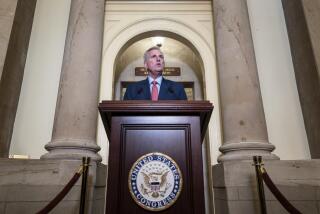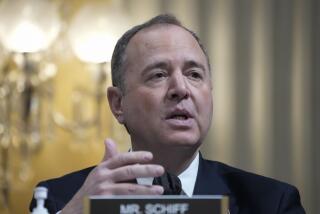Impeachment: Mueller report revives the issue. Some Democrats wish it would go away
Earlier this month, when Atty. Gen. William Barr sent Congress his view of the “principal conclusions” of Robert S. Mueller III’s investigation, the case for impeachment of President Trump seemed closed.
Mueller had found “no collusion” between the Trump campaign and Russian agents who tried to sway the 2016 election, Barr said. And he offered his own judgment that Trump had done nothing to warrant an obstruction of justice charge.
Thursday, however, when Barr released a redacted version of the full report to Congress and the public, it quickly became apparent that what Mueller said was very different from Barr’s gloss. Among Democratic activists and members of the party’s left wing, impeachment talk almost immediately revived.
Sign up for the Essential Politics newsletter »
THE IMPEACHMENT CONUNDRUM
Renewed discussion of impeachment poses a headache for Speaker Nancy Pelosi and other Democratic leaders.
Pelosi made clear last month that she doesn’t want the House to spend the rest of the year in an impeachment debate.
“He’s just not worth it,” she said, referring to Trump, in an interview with the Washington Post.
Comments from House leaders Thursday showed that Mueller’s report hadn’t changed their thinking on the issue.
Asked about impeachment, Rep. Jerrold Nadler, the chair of the House Judiciary Committee, which would handle the subject, demurred.
“That’s one possibility,” he told reporters. “There are others.”
As Jennifer Haberkorn wrote, congressional Democrats see Mueller’s report as a road map for further investigation. They disagree, however, about their desired destination.
The problem as Pelosi and her allies see it: Impeachment excites partisans, but not swing voters and other, less committed sorts who want to see their elected representatives working on issues that affect them personally, such as healthcare.
The way to defeat Trump is to beat him in an election, they argue, and the way to do that is to focus on those everyday issues.
The argument from the other side: Mueller laid out a clear case of abuse of power, one incident after another in which Trump tried to interfere with a federal investigation. And the special counsel clearly left the final decision up to Congress, which he specifically referred to in his report.
What precedent would be set by allowing Trump’s conduct to go unpunished, impeachment proponents ask?
Pelosi has called a meeting of House Democrats for Monday to discuss how to move forward.
MUELLER’S KEY FINDINGS
Mueller’s 448-page report provides official confirmation, backed up by sworn testimony and subpoenaed documents, of more than two years of news reporting about the frenzied, dysfunctional and mendacious operation Trump presides over.
First, as Chris Megerian wrote, the report makes clear that Trump’s campaign “had a symbiotic, if not criminal, relationship with Moscow’s tampering.”
The evidence doesn’t show that campaign aides conspired with Russian efforts to sway the election. It does show that the campaign welcomed the Russian help and, as the report says, “expected it would benefit.”
On the second major issue — whether Trump sought to obstruct the investigation — the report shows that he surely tried, as Del Wilber and Megerian wrote.
“The President’s efforts to influence the investigation were mostly unsuccessful, but that is largely because the persons who surrounded the President declined to carry out orders or accede to his requests,” the report says.
Indeed, the willingness of high-level administration officials to ignore Trump and fend off his mercurial demands forms one of the recurring themes of the report.
As Eli Stokols wrote, Trump panicked early on over the investigation and flailed around trying to block it. His aides’ insubordination likely saved him from much worse trouble.
Lying forms another key theme. Trump aides and associates lied to the public, lied to each other and, especially in the president’s case, lied to themselves.
In some cases, they also lied to investigators, leading to the false statement charges that snared several top Trump aides. Most of Trump’s aides spoke extensively to Mueller and his team and appear to have testified honestly. Some of them now fear that will get them in trouble with Trump.
As for the president, himself, his written answers to questions posed by investigators showed a remarkable lack of memory — 34 instances of “I don’t remember,” “do not recall” and “no recollection,” as Janet Hook wrote.
Trump avoided testifying in person: His lawyers feared he would commit perjury. As David Willman wrote, Mueller decided not to engage in a lengthy fight to compel his testimony. But some former prosecutors think that means he lost some key evidence he might have gotten.
For those who don’t have time to read the full report, my colleagues summarized what it had to say on all sorts of questions, including whether compromising videotapes of Trump exist and why Mueller decided against charging Donald Trump Jr. on campaign finance violations. And Megerian and Anna Phillips summarized the highlights.
NEXT BATTLEGROUND — REDACTIONS
As Sarah Wire reported, more than one-third of the pages in the public version of Mueller’s report have redactions of some sort. In some cases, only a few words are blacked out. In others, black bars cover almost the entire page.
John Schleuss produced a great visual showing the scope of what has been blocked from public view.
Barr said he would let congressional leaders see some of the redacted material — passages that were blacked out because they reveal classified material, for example. But material held back because it involves grand jury testimony will remain off limits, he said.
Democratic leaders say Congress has a right to see the grand jury testimony, too. Legal precedents are uncertain on that issue. Look for that to form a major point of contention.
DEMOCRATIC CANDIDATES: THEIR MONEY
Mueller wasn’t the only news of the week, although it sometimes felt that way.
Sen. Kamala Harris released 15 years of her tax returns. As Melanie Mason and Matt Pearce wrote, Harris joined other Democrats, including Sen. Bernie Sanders, in releasing their returns as part of an effort to draw a sharp contrast with Trump.
We also learned a lot more about the candidates’ finances. Monday was the deadline for campaigns to file their first-quarter financial disclosure reports. As Evan Halper wrote, the reports made clear that big checks remain the lifeblood of most candidates’ campaigns.
Despite all the talk about grass-roots donors, Sanders, so far, is alone in being able to finance his campaign solely with small donations. Sen. Elizabeth Warren is trying, but she’s not raising enough so far to sustain her large campaign operation.
Harris is the early favorite among Hollywood donors, Michael Finnegan wrote.
AND THEIR ISSUES
Harris has had to walk a difficult line in discussing her background as a prosecutor. Her aides believe it will remain a political asset for her in the long term, appealing to general election voters. But in the primaries, she needs to reassure more liberal party activists who mistrust law enforcement.
This week, Finnegan wrote, Harris expressed regret for a truancy law that had been one of her signature achievements as California attorney general. The state law, which built on her work as district attorney in San Francisco, led to the arrests of some parents, which Harris called an “unintended consequence.”
Joe Biden also is dealing with problems in his past. In his case, one major issue is his handling of Anita Hill’s harassment allegations against Clarence Thomas, when he was nominated to the Supreme Court. Hook went back and reviewed the record to answer the question: What did Joe do?
And as Mark Barabak wrote, a raft of issues that were little noted in previous campaigns are getting an airing this year: abolishing the electoral college, ending the Senate filibuster, refashioning the Supreme Court, reparations for slavery.
In part, the wide range of topics reflects a huge field of candidates looking for ways to distinguish themselves. In part, too, it stems from the overall leftward shift of the party.
Not everyone is looking for issues to run on, however. As Doyle McManus wrote, Pete Buttigieg has avoided taking positions on a host of topics. His campaign, like that of former Rep. Beto O’Rourke, is focused more on biography and generational affinity. Eventually, however, both men likely will need to get more specific.
THE GOP TAX LAW
On tax day, a new USC-Dornsife/Los Angeles Times poll showed that most Americans don’t feel like the new law made them better off, even though about two-thirds of taxpayers did receive some amount of a tax cut.
That’s a disappointment for Republicans, who once hoped for big political benefits from the law. But it shouldn’t come as a surprise.
As political scientists have know for years, it’s hard to convince voters that their taxes have gone down. That’s especially true when the extra money comes in small increments in their paychecks.
President Obama’s administration ran into the same problem with their tax cut in 2009. President George W. Bush took a more politically beneficial approach to his tax cut in 2001 — sending people a very noticeable refund check.
Economists say, however, that Bush’s approach weakens one of the benefits that is often the goal of a tax cut — stimulating growth — because many people save the lump sum rather than spending it.
KATIE V. KATIE
Finally, Haberkorn offers a tale of congressional confusion: Washington has no problem keeping track of numerous members of the House named John, but somehow, two representatives named Katie are too much.
Freshmen Reps. Katie Porter of Orange County and Katie Hill of northern Los Angeles County keep getting confused for each other.
LOGISTICS
That wraps up this week. Until next time, keep track of all the developments in national politics and the Trump administration at our Politics page and on Twitter @latimespolitics.
Send your comments, suggestions and news tips to politics@latimes.com.
If you like this newsletter, tell your friends to sign up.
More to Read
Get the L.A. Times Politics newsletter
Deeply reported insights into legislation, politics and policy from Sacramento, Washington and beyond. In your inbox three times per week.
You may occasionally receive promotional content from the Los Angeles Times.











